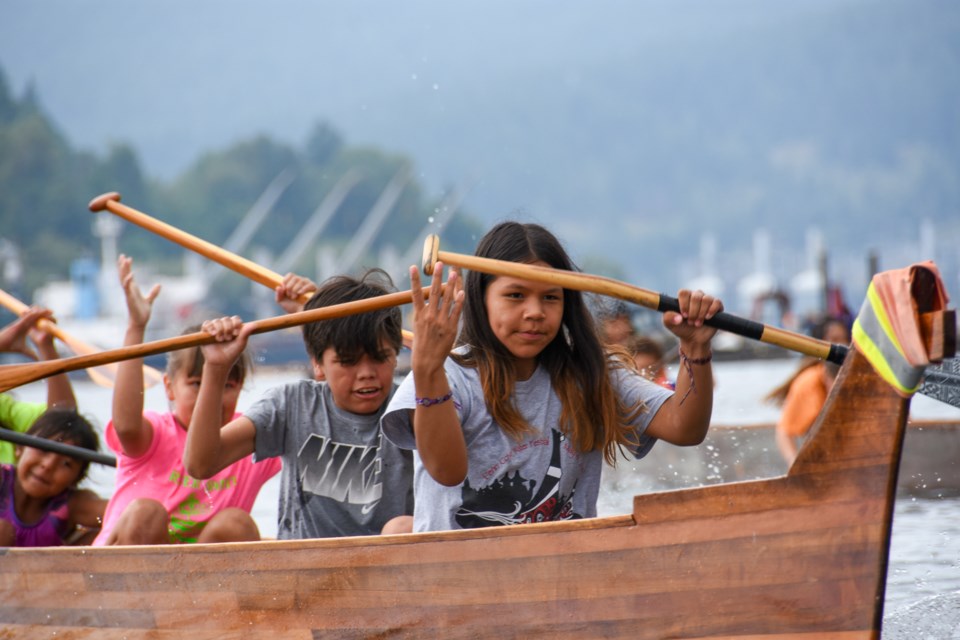From the edge of Rocky Point pier, the war canoes cut a line towards the head of the inlet, frothing wakes trailing behind the painted orange and resin-treated hulls.
From the shore, Breanna Hall watched.
“Looks like fun,” she said as the pullers (paddlers) from Scowlitz and Skwah First Nations jockeyed for the win.
Last Saturday, Fish Fest came back to Port Moody, and with it young Indigenous paddlers gathered at Rocky Point Park to race canoes in what is believed to be the first event of its kind in more than 100 years, according to Kwikwetlem First Nation organizer Stephen Armstrong.
The event brought together the Sto:lo nations of Scolitz and Skwah, together with the Tsleil-Waututh and Kwikwetlem nations, whose territories overlap around Burrard Inlet. Unlike races held on reserve, Armstrong organized the event to be inclusive so that Indigenous and non-Indigenous people could watch together.
Armstrong, who lives off reserve in Metro Vancouver, has a clear view of the continued discrimination against Indigenous youth and what events like Fish Fest can do to help.
“That ‘dirty Indian’ persona is still there,” he said. “The only way to fight it is to empower our youth as our next generation of leaders so that they portray that self confidence.”
That, says Armstrong, is where canoe pulling comes in.
But while elders from many nations — including Kwikwetlem Chief Ed Hall — witnessed the event, no one from the local First Nation dipped a paddle in the water Saturday. Armstrong says canoe pulling has fallen off among the Kwikwetlem youth.
For the Scolitz, up valley and on the water, you can see how canoe pulling has become an all-encompassing way of life. Chrystal McCallum Williams and her husband, Chief Sunny Williams, have brought together young Indigenous canoe pullers through the Golden Eagles Canoe Club (Ts’esqel), a team that has opened its arms to other nations in the Agassiz area.
“They’re not out there playing with video games, not sitting in front of a TV,” said Kathy James, whose two granddaughters, Tashuana and Hasana, competed in the Port Moody race. “These kids are dedicated to seven days a week of training, four hours a day on the water. No alcohol, no drugs.”
Sitting under the gazebo at the end of Rocky Point pier, James reminisced about how much has changed in the Tri-Cities since she grew up in Burquitlam in the 1960s and ’70s.
Daughter of a Caucasian mother and O’Chiese father from Rocky Mountain House, Alta., James attended Centennial secondary school at a time when she was afraid to tell her first boyfriend about her Indigenous side.
“Being in the city where you can’t be native, it makes it really hard. It was a suppressed way of life,” she told The Tri-City News, stressing that her father always feared his daughter would be whisked off to a residential school.
Every summer, her family would travel back to Alberta to reconnect with their roots through powwows.
“That’s how we had to live. We didn’t have a choice,” she said. “ It was like living a lie.”
James now lives near Agassiz, where she celebrates her Indigenous side and says canoe pulling has taken over the role powwows once played, connecting young people to their past.
Seeing that play out on the waters around Port Moody — a place where she remembers “nothing native” as a kid — “really warms the heart.”
At the end of the race, the war canoes get hoisted out of the water, someone roasts a salmon on a barbecue and a sea-life-inspired puppet show plays out on the grass. Under a pop-up pavilion, organizers prepare prize money for the winners as a Venezuelan punk rock band blasts an ode to family members left behind.
“I was never good at doing cultural things on reserve,” said Armstrong, adding he’s always been better at bridging groups than working inside of them.
Armstrong pointed to seven-year-old Jack Williams, son of the Scowlitz chief, who holds the honorary title of Kwikwetlem as a middle name. “Our ancestors spread out to the valley, descendants of [the original] Kwikwetlem William. We’re all of Kwikwetlem,” he said.
“If we can get more canoe races going here, have more canoe families join us — urban indigenous people, on-reserve indigenous people — we can make this grow.
“The spirit is reawakening. We never lose our culture. It goes to sleep. And this is just one of the ways that it is starting to reawaken.”



